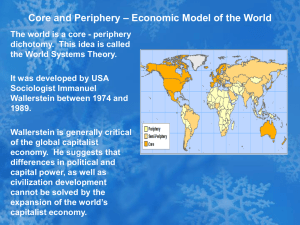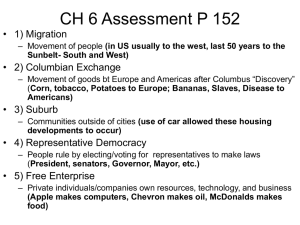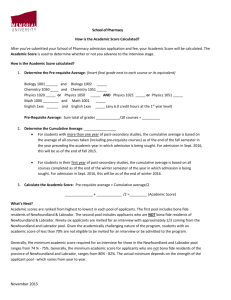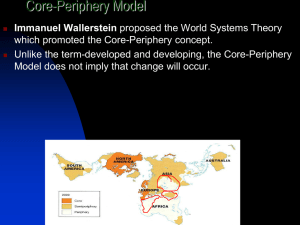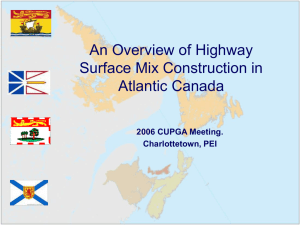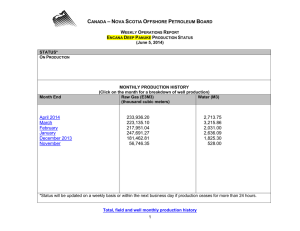ppt file - Arizona Geographic Alliance
advertisement
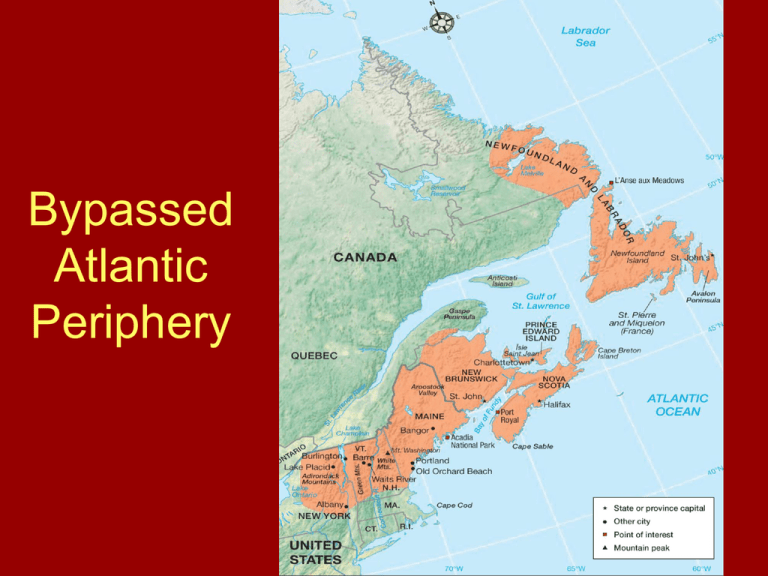
Bypassed Atlantic Periphery “Bypassed East” • Newfoundland & Labrador, northern New England, Adirondack region of New York – A transportation shadow • Slow economic growth • Settled early, but became increasingly isolated • Relatively few large urban areas Physical Geography • Topography – Northern extension of the Appalachian Mountains – Green Mountains (Vermont) • Range to 4,600 ft • Ice covered during the Pleistocene – White Mountains (New Hampshire) • Extend to 6,500 ft • Upper slopes rugged and steep – Mountains of the Atlantic Provinces • <2,200 ft and well rounded Physical Geography • Climate – Maritime impact minimized by continental and polar air masses (Dfb & Dfc) – Labrador Current flows southward chilling coastal waters – Generally, the climate is seldom hot, often cool, and usually damp Early Settlers • Early 1600s - initial settlers relied upon three means to support their livelihood – Fishing: cod and haddock – Timbering, especially focusing on white pine – Agriculture, mainly subsistence Agriculture • Present Trends – < 10% of New England is farmland – Agricultural peaked during the late 1800s; farms decreased by 66% – Today’s farming is specialized, single crop production • Major Areas and Products – Aroostook Valley (NE Maine) • Silty loam soils • Newest commercial agricultural area • Suffers from competition with Idaho and Oregon • Major Areas and Products – Lake Champlain Lowland • Serves as a milk shed for the Megalopolis cities of Boston and New York • Major Areas and Products – Prince Edward Island – Annapolis Valley Cranberry Farming, Maine Tulip Farm, Prince Edward Island Major Agricultural Areas Economic Mainstays • Forestry – Limited role: lack reforestation – Northern Maine: pulpwood – Forestry products – Northern New Brunswick and Newfoundland: pulp and paper Economic Mainstays • Fishing – Inshore more important – Nova Scotia: leads all provinces in total catch each year – Newfoundland, New Brunswick, and PEI are 3rd, 4th , and 5th – Maine lobster industry vitally important to New England • 70% of the region’s total catch Offshore Banks Economic Mainstays • Mining – Natural gas and oil; limited coal in Nova Scotia – Plentiful building stone • Tourism - a mixed blessing? – Summer and Spring: hiking, fishing, camping, canoeing, and sightseeing – Fall: foliage – Winter: skiing and winter sports Spillovers from Megalopolis Canadian Places on the Periphery Halifax, Nova Scotia American Places on the Periphery The Future? Discussion Questions The now-bypassed periphery used to be the “front door” to Europe. Can (or should) the Periphery return to that past glory? Since the region is basically at the doorstep of Megalopolis, might it turn into a place where Megalopolis residents take away the Bypassed Atlantic Periphery’s sense of place? Related Books • Irving, John. 1985. The Cider House Rules. New York: Ballantine. – Coming of age novel set in 20th century Maine. • Jenkins, Jerry and Andy Keal. 2006. The Adirondack Atlas: A Geographic Portrait of Adirondack Park. Syracuse: Syracuse University Press. – Everything you wanted to know about anything Adirondack in concise, one-page essays! • Montgomery, Lucy Maud. 1908. Anne of Green Gables. Boston: L. C. Page & Co. – Famous novel that takes place on Prince Edward Island. • Wood, Joseph S. 1997. The New England Village. Baltimore: The Johns Hopkins University Press. – A solid historical geography of rural New England. WebSources • Nova Scotia Tourism http://novascotia.com/en/home/default.aspx • Newfoundland and Labrador Quickfacts http://www.educationcanada.com/facts/index.phtml?sid=nf&a=1&la ng=eng • Native Americans—Algonquian Language Family http://www.native-languages.org/famalg.htm • The Great Stone Face http://www.nh.gov/oldman/ • Atlas of Canada Maritime Provinces http://atlas.gc.ca/site/english/maps/reference/provincesterritories/m aritimes



